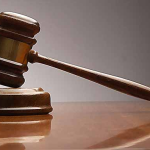Salvaging The Nigerian Judiciary By Adewale Kupoluyi
Articles/Opinion, Latest Headlines Sunday, May 18th, 2014
The rot in the judiciary appears to be worsening by the day. As a sacred institution that is saddled with the administration of justice, all efforts should be deployed to ensure that the canker-worm called corruption tearing the soul of this important arm of government is uprooted without further delay. Judicial corruption could be a deliberate act or omission that promotes the use of public authority for the private benefit of judges, court personnel and other justice sector officials resulting into improper, unfair delivery of judicial decisions, abuse of court procedures and inappropriate influence on the impartiality of the judicial process.
 Corruption of judges is nothing but a clear indication of the inability of the various anti-graft agencies to nip the monster in the bud. Corruption may remain in the bench as long as judges found culpable are not given stiff and deserved punishment. Without prejudice, Nigerian judges have been accused of belonging to political parties and associating with controversial social gatherings. This should not be. Judges, by virtue of their noble calling are expected to distance themselves from politicking and flirting with people of questionable character because a corrupt judicial officer could be likened to a malignant growth in the body – which should urgently be expunged from the body – otherwise it will spread fast and contaminate other healthy body organs. To the image of the nation, it could lead to total loss of corporate credibility since the judicature remains the sole custodian of justice, interpreter of the laws, hope of the common man and conscience of the nation.
Corruption of judges is nothing but a clear indication of the inability of the various anti-graft agencies to nip the monster in the bud. Corruption may remain in the bench as long as judges found culpable are not given stiff and deserved punishment. Without prejudice, Nigerian judges have been accused of belonging to political parties and associating with controversial social gatherings. This should not be. Judges, by virtue of their noble calling are expected to distance themselves from politicking and flirting with people of questionable character because a corrupt judicial officer could be likened to a malignant growth in the body – which should urgently be expunged from the body – otherwise it will spread fast and contaminate other healthy body organs. To the image of the nation, it could lead to total loss of corporate credibility since the judicature remains the sole custodian of justice, interpreter of the laws, hope of the common man and conscience of the nation.
Regrettably, judges with integrity problems are known to engage in reckless granting of interlocutory injunctions, give reliefs not sought by plaintiffs, grant judgments that have no basis in law and ensuring that important cases remain for years in their courts unattended to. Several examples abound that show the failure of the Nigerian judiciary. Recently, a report by the Economic and Financial Crimes Corruption (EFCC) had alleged that some judges – who were supposed to be above board, were found with illicit funds whose sources they could not convincingly defend. Also, an outspoken and retired judge of the Court of Appeal, Justice Ayo Salami had lamented that corruption in the judiciary was still deep-seated and ‘a sore that has refused to heal’, as he chided some of his retired senior colleagues for allegedly perfecting the act of bribing serving judges, to pervert the course of justice. Nigerians too will not forget so easily, the dismissals of Justice Charles Archibong of the Federal High Court and Justice T. D. Naron of the Plateau State Judiciary for improper administration of justice while Justice Shadrach Nwanosike of the Abia State Judiciary was also recommendation for retirement by the National Judicial Council for an alleged falsification which ‘invariably affected his retirement age’. The ‘infamous ruling’ by Justice Marcel Awokunlehin concerning Chief James Ibori, the Delta State governor between 1999 and 2007 – who was freed of corruption charges leveled against him by the EFCC – in spite of overwhelming evidence against him, was eventually sentenced to a 13-year prison term by a British court for the same offences, is still fresh in our memory. Corruption, by its nature, is attitudinal, social problem and a chronic national disease.
As a way out of this quagmire, there is an urgent need to embark on judicial reform involving a multitude of institutions and players in a bid to improving our legal system – the entire legal framework of regulations, constitution, statutes, customary law, international legal obligations, as well as other institutions within the judicial process – to guarantee fair-play, efficiency and the rule of law. To begin with, the way and manner judges are appointed and promoted these days is anything but objective and professional because cherished ideals of integrity, hardwork, competency and good standing appear to have been jettisoned for political patronage, nepotism, cronyism, lopsidedness and ethnicity. What is in dire need is that radical, judicial reform that would cut across the entire judicature at the federal and state levels. The most important component of judicial reform and anti-graft crusade that we are talking about is to ensure the independence of the judiciary by preventing undue influence from the ‘almighty’ executive and the over-bearing legislative branch of government. It appears the anti-corruption search-light has been beamed too much on other arms of the government at the neglect of the judiciary.
To date, many Sub-Saharan African countries still face judicial corruption today because of the complex factors that bordered on appointments, promotions, discipline, remuneration and judicial funding. Therefore, there should be adequate pay packet for judges and other court personnel. Poor remuneration invariably leads to poor motivation and commitment of these officials and the resultant likelihood of seeking bribes as an avenue – though condemnable means and quick – of acquiring financial security. Judicial integrity, another weapon against corruption, is seen as the heart and soul of the rule of law. It is necessary to establish clear codes of conduct, ethics, training and education to judicial officers and the increasing judicial effectiveness lies in the automation of court management and the adjudication process through computerization of records that minimizes the incidents of vital documents, rampant manipulation and improper interference with highly confidential legal materials bearing in mind that justice delayed is justice denied.
Other remedies include embracing alternative dispute resolution methods. These mechanisms will not only increase public access to justice but will also reduce the burden on the overwhelming judiciary by allowing more resources to be devoted to anti-graft crusade. The nation has the track record of implementing an alternative dispute resolution system that has proven effective by increasing access to justice. The EFCC and the Independent Corrupt Practices and other related offences Commission (ICPC) should also be better equipped to perform their statutory functions without economic, administrative and political encumbrances while the investigation of public officers, including judges should be pursued to a logical end. The current practice of using mere retirement as punitive measure cannot help in cleaning the rot in the judiciary. Judges indicted for corruption, unethical, reprehensible acts, illicit conduct and criminal tendencies, just like every other citizen, should be made to face the full wrath of the law. Those that uphold the virtues of honesty, accountability and transparency should persevere and made to realize that it pays to shun corruption.
On the recommendation that the office of the Minister of Justice should be separated from the office of the Attorney-General of the Federation as a panacea in setting the stage for a truly independent judiciary. While I feel that there is nothing bad in giving the proposal a trial, what should be paramount is to have credible persons at the helm of affairs otherwise it would amount to naught because we know that corruption has festered deeply in this country largely because of the predisposition of the human factor as well as the overbearing, bureaucratic incentive. The adverse effects of corruption are enormous. Despite the abundant natural and human resources endowed us as a nation, other less-endowed countries not as blessed as Nigeria seem to be doing better than us and the main reason why that is possible is not because there are no corrupt people there; it is just because the institutions are made strong and those who steal from the treasury are tried and severely dealt with. But in our country, the reserve seems to be the case as those who steal billions from the public coffers are hardly apprehended and jailed. This is what has fueled frantic calls by the anti-corruption agencies and other well-meaning people for the establishment of special courts for trial of corruption suspects. As it is, the call appears more that than ever before, necessary.
On a final note, while lauding the NJC for its effort at restoring sanity in the judiciary, government, jurists, legal practitioners and members of the public should do more in keeping the sanity of this institution. However, while we must honestly admit that in spite of the dark side of the bench, Nigeria has, no doubt, produced many respected judges that have been a source of pride to the profession and the country. The likes of late Justices Kayode Eso and Chukwudifu Oputa readily come to mind. I am sure, there are certainly more of them that have either retired or still in active service in the various courts. Hopefully, we will one day have every cause to celebrate those that are above board, going by the assurance of the Chief Justice of Nigeria (CJN), Mariam Alooma Mukhtar that she would lead by example by shunning corruption. Her determination, posturing and political-will is commendable. It is only hoped that other judicial officers in the country would toe the line of the CJN.
Kupoluyi writes from the Federal University of Agriculture, Abeokuta, vide, adewalekupoluyi@yahoo.co.uk, Twitter, @AdewaleKupoluyi
Related Posts
Short URL: https://www.africanexaminer.com/?p=11512




















